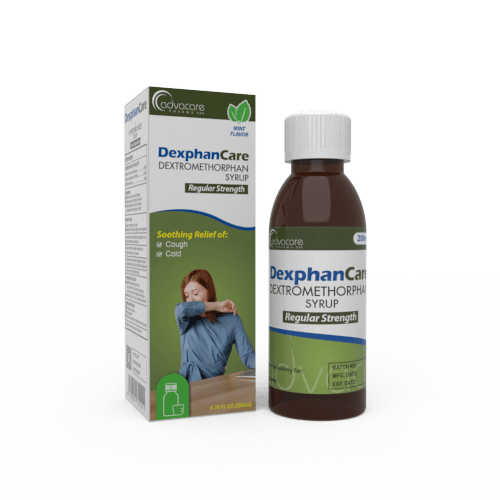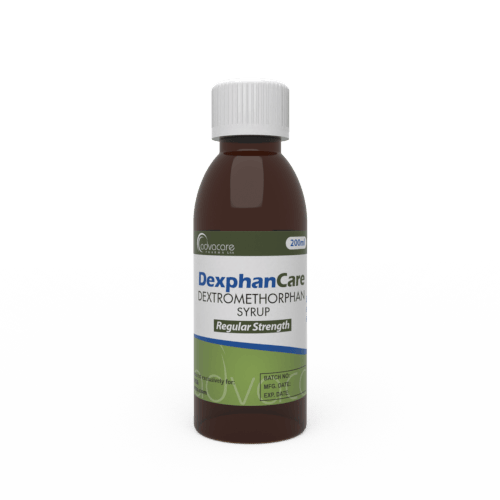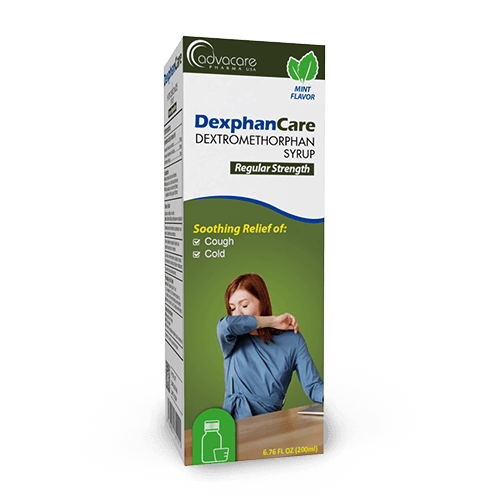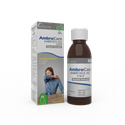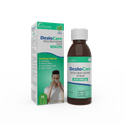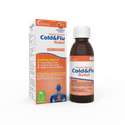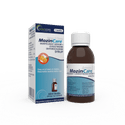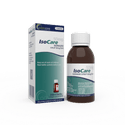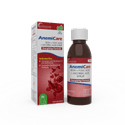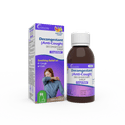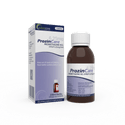- Home›
- Pharmaceuticals›
- Syrups›
- Dextromethorphan Syrup
Dextromethorphan Syrup
Dosage
Packaging
What is Dextromethorphan?
Active Ingredients: Dextromethorphan
Dextromethorphan Syrup is an anti-cough drug used to temporarily treat dry cough associated with the common cold, flu, or sinusitis. This cough suppressant is recommended for adults and children over 6 years old. Dextromethorphan is not recommended to treat coughs associated with asthma, emphysema, or smoking.
Dextromethorphan's antitussive action begins to work quickly within 15-30 minutes of administration.
Dextromethorphan is a cough suppressant that is classified as a morphinan. It is a non-narcotic opioid derivative of levorphanol. The active ingredient is typically used for its anti-cough properties, and it works by interfering with the cough reflex in the brain.
Dextromethorphan Syrup is produced in two dosages: 2mg/ml and 3mg/ml. It is available as a 100ml bottle or a 200ml bottle.
Dextromethorphan Syrup is produced and exported by AdvaCare Pharma. This medication meets GMP standards and is manufactured in our facilities in China, India, and the USA. We regularly audit our production factories to ensure they comply with WHO guidelines and standards.
Why choose us as your Dextromethorphan Syrup manufacturer?
AdvaCare Pharma is a reputable manufacturer of Dextromethorphan Syrup, and other pharmaceutical syrups, with a presence in 65 countries. We have implemented a "vested supplier-distributor relationship" business model that differentiates us from other large-scale medical manufacturers, facilitating a closer partnership with our pharmaceutical distributors. With a range of more than 500 GMP-approved medicines, including 55+ treatments in oral liquid dosage form, we are a Dextromethorphan Syrup manufacturer that doctors trust and patients rely on.
Uses
What is Dextromethorphan Syrup used for?
It is used to temporarily relieve a non-productive, dry cough that may be caused by the common cold, allergies, or inhaled irritants.
Can Dextromethorphan Syrup be used for a wet cough?
This medication is not recommended for a productive cough with large amounts of phlegm. It is also not recommended for chronic coughs.
How is Dextromethorphan Syrup used?
This medication is manufactured as a liquid to be taken orally. It is important to carefully measure the liquid for each dose. If an upset stomach occurs, this medicine can be taken with food or milk. It is recommended to drink plenty of fluids while taking this medication. Do not take more than the recommended dose or take it more frequently than indicated, as this may result in severe harm.
How should Dextromethorphan Syrup be stored when not in use?
This medication should be stored in its original packaging when not in use. It is advised to keep it at room temperature in a location that is away from moisture, heat, and direct light. Do not freeze the syrup. Before use, check the expiry date and discard any expired medicines.
What dose should be taken?
Adult Dosing For cough, the usual dose is 10-20mg, taken every 4 hours. Alternatively, 30mg can be taken every 6-8 hours. The maximum dosage is 120mg in 24 hours.
Renal Dosing Adjustment guidelines for this medication are not defined.
Hepatic Dosing Adjustment guidelines for this medication are not defined.
Pediatric Dosing For cough, the usual dose is as follows:
- For adolescents and children over 12 years old: 10-20mg, taken every 4 hours. Alternatively, 30mg can be taken every 6-8 hours. The maximum dosage is 120mg in 24 hours.
- For children aged 6 to 12 years old: 7mg taken every 4 hours, or 15mg taken every 6-8 hours. The maximum dosage is 60mg in 24 hours.
- For children aged 4 to 6 years old: 3.5mg taken every 4 hours, or 7.5mg taken every 6-8 hours. The maximum dosage is 30mg in 24 hours.
This medicine is not recommended for children under 4 years old.
Renal Dosing for pediatrics Adjustment guidelines for this medication are not defined.
Hepatic Dosing for pediatrics Adjustment guidelines for this medication are not defined.
Refer to a doctor or pharmacist for guidelines on dosage. Dosage recommendations may vary between regions and individual products. Always consult the packaging insert before taking this medication.
What happens if a dose is missed?
Cough medicine is often used as needed. If there is a dosing schedule, any missed dose should be skipped if it is nearly time for the next dose. Two doses should not be taken at the same time.
What are the symptoms of an overdose?
Some common symptoms of an overdose include nausea and vomiting, dystonia, ataxia, agitation, confusion, psychosis, cardiotoxicity, CNS depression, dizziness, and hypotension. Coma or convulsion may result from a high dosage. Contact emergency services immediately if an overdose is suspected. It is advised to give activated charcoal to asymptomatic patients within 1 hour of overdose. Symptomatic and supportive treatments are recommended for the management of overdose, such as naloxone for sedated or comatose patients or benzodiazepines for those experiencing seizures.
Who can use dextromethorphan?
Dextromethorphan Syrup can be given to adults and children, but caution is advised for specific groups of patients.
Pregnant This medication should only be used in pregnant women if the benefits outweigh the risks. Based on human data, there is no known risk of adverse effects on the fetus.
Breastfeeding It is unknown if dextromethorphan is excreted in milk, though it may be likely based on the low molecular weight of the drug action should be expressed and the benefits must be weighed against the risks when used during breastfeeding. Based on the drug properties, dextromethorphan is not expected to cause adverse effects in infants, but no human data is available to properly assess the risks.
Children This drug should be used cautiously in pediatric patients and should not be given to children under 12 unless under the guidance of a doctor. For children under 6 years old, it is important to note that 10mg/kg is a potentially toxic dose. There is also a higher risk of overdosage and toxicity in children under 2 years old.
Geriatric Cough syrups should be used cautiously in elderly patients, as they may be more susceptible to side effects.
Other warnings
Dextromethorphan is contraindicated with the concurrent use of nonselective MAO inhibitors, as it may cause serotonin syndrome. It is advised to use caution for patients taking other medicines affecting serotonin, such as SSRIs, TCAs, or drugs used to treat Parkinson's disease.
For patients who are sedated or debilitated and those who are confined to a supine position, caution is advised when treating with dextromethorphan.
For patients with liver impairment, this drug should be used with caution, as dextromethorphan undergoes hepatic metabolism.
Dextromethorphan may be associated with the release of histamine. It should be used with caution in atopic children.
For patients with phenylketonuria, it is important to carefully read the ingredients, as some preparations may contain phenylalanine.
Side Effects
As with all pharmaceuticals, some unwanted effects can occur from the use of Dextromethorphan Syrup.
Common side effects include, but may not be limited to:
- nausea and vomiting
- constipation
- sedation
- dizziness
- lightheadedness
- drowsiness
- nervousness
- tingling
- drug dependency with long-term use
- respiratory depression
Call a doctor or seek medical attention if the following symptoms occur:
- rash
- signs of an allergic reaction
- severe confusion or nervousness
- blurred vision
- painful urination
For a comprehensive understanding of all potential side effects, consult a medical professional.
If any symptoms persist or worsen, or you notice any other symptoms, please call your doctor.
Precautions
Do NOT use Dextromethorphan Syrup if:
- You are allergic to any of the other ingredients.
- You have used an MAO inhibitor in the past 14 days.
This medication may not be suitable for people with certain conditions. It is important to consult with a doctor if you have any health conditions, including:
- current smoker
- a cough with large amounts of mucus
- respiratory problems
- phenylketonuria
- liver problems
- history of asthma
- substance misuse disorder
- mental health disorder
- poor metabolizers of CYP2D6
- pregnancy or breastfeeding
Possible interactions may occur with other pharmaceutical products, including MAO inhibitors (e.g. isocarboxazid, linezolid, methylene blue injection, phenelzine, rasagiline, selegiline, tranylcypromine). Consult with a doctor or pharmacist about any medications, supplements, and herbal products you are taking before starting your treatment. It is recommended to avoid taking dextromethorphan with other drugs that cause drowsiness or affect breathing (e.g. opioids, muscle relaxers, anticonvulsants, anxiolytics).
It is advised to avoid drinking alcohol when taking dextromethorphan, as it may increase certain adverse effects. Alcohol may increase the CNS depressant effects of this medication.
Dextromethorphan may cause dizziness and impaired reaction times. It is advised to avoid driving and operating machinery during treatment with this medication.
Dextromethorphan Syrup is not intended to treat a persistent or chronic cough associated with smoking, asthma, or emphysema. It is also not intended to treat a wet or productive cough.
This medication should only be used as directed by the label or package insert. When not prescribed by a doctor, cold medications, such as Dextromethorphan Syrup, are not considered safe for use in children younger than 6 years.
If symptoms do not improve within 7 days of treatment or a fever or rash appears, contact your doctor.
Some formulations of this product may contain phenylalanine.
In the event of an upcoming surgery, it is important to inform the surgeon that you have recently taken this medication.
This medication may interfere with certain laboratory tests so inform medical staff if you have taken this drug within a few days. Dextromethorphan may cause false-positive results for phencyclidine, opioids, and heroin during urine drug screening.
References
Assessment of antitussive efficacy of dextromethorphan in smoking related cough: objective vs. subjective measures
The main objective of this study was to measure the antitussive effects of dextromethorphan compared with placebo in an established model of smokers cough.
This is a randomized, double-blind placebo controlled, crossover comparison of 22mg 0.8ml⁻¹ dextromethorphan delivered pregastrically with matched placebo and included objective and subjective measurements of cough.
Subjective measures consisted of a daily diary documenting cough symptoms and the completion of the Leicester Quality of Life questionnaire. Cough frequency was tracked using a manual cough counter. The objective measure of cough reflex sensitivity was conducted through the citric acid dose–response cough challenge.
The conclusion of this study is that dextromethorphan effectively diminishes the cough reflex sensitivity.

You might be interested in...
Why AdvaCare Pharma?
As an industry leader, we are aware of our responsibility to provide affordable and sustainable solutions to improve healthcare worldwide.
